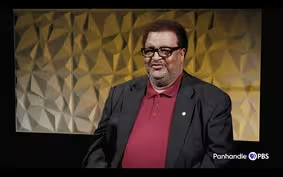Living While Black
Be Better
Clip: 4/8/2021 | 3m 18sVideo has Closed Captions
Black Amariloans discuss a common piece of advice they got when they were younger.
Black Amariloans discuss a common piece of advice they got when they were younger.
Problems playing video? | Closed Captioning Feedback
Problems playing video? | Closed Captioning Feedback
Living While Black is a local public television program presented by Panhandle PBS
Living While Black
Be Better
Clip: 4/8/2021 | 3m 18sVideo has Closed Captions
Black Amariloans discuss a common piece of advice they got when they were younger.
Problems playing video? | Closed Captioning Feedback
How to Watch Living While Black
Living While Black is available to stream on pbs.org and the free PBS App, available on iPhone, Apple TV, Android TV, Android smartphones, Amazon Fire TV, Amazon Fire Tablet, Roku, Samsung Smart TV, and Vizio.
Providing Support for PBS.org
Learn Moreabout PBS online sponsorship- I'm a statistic.
My father was incarcerated most of my life.
I was raised by a single, hardworking, God-fearing mother.
Thank you, Lord.
But I had to have the talk at an early age that you have to work twice as hard.
And that when you mess up, it will follow you forever.
That you don't almost have an opportunity to make a mistake because they won't let that go.
It's good because you can work hard, but then it's like, "You don't have the option to fail."
And so I think, as when we do fail, it's just, "Oh God."
It can be devastating.
- You're three steps behind.
Always.
And I feel like that was something that propelled me a lot because I feel like we are the Black community because we're put to such a low standard and we're expected to meet this standard if not be below it.
So that's just kind of all we're given, you know?
You're given just enough to meet the standard.
- My mom, I remember, telling me, "You have to work twice as hard to get half the credit."
And I just knew that I had to be good at my schoolwork.
And, people will respect me for what I do.
- When I was at school I wasn't allowed to wear blue jeans.
And my dad said it's because when he was a kid he had to get up, go check the cows, cut hay, whatever, before he went to school.
And he said, "I work enough for you "that you don't have to look like a sharecropper.
"You can put on decent clothes and go to school."
That also led to the thing of, whatever you do, you have to do it five times better than that white kid.
Why?
Because that's just the way society is.
They're gonna look as you as the lesser no matter what you do.
Whatever you achieve.
And you're gonna be looked upon as lesser.
So you always have to show respect and dignity and self-pride and self-love.
- My parents told me the exact same thing.
If my friend is white and they have a job and they are doing it well, I had to do it twice as good.
So, if I was cleaning toilets, I had to be twice as good.
- [Interviewer] Just to be looked at as even?
- Right.
That's exactly right.
- It kinda becomes this competitiveness where you have to be better than everyone just to be taken seriously.
And I think to a certain extent, that's unhealthy.
I don't think there's anything wrong with like friendly competition, or wanting to be better, or bettering yourself, but if you're doing it only for the sake of getting people to even listen to you, then (mournful music) eventually you're going to not have anything else to give.
And you're gonna wonder why you're not enough.
Video has Closed Captions
Clip: 4/8/2021 | 11m 16s | A look at the desegregation of Amarillo schools. (11m 16s)
Video has Closed Captions
Clip: 4/8/2021 | 3m 31s | Learn where Park Hills Elementary School got its name. (3m 31s)
Video has Closed Captions
Clip: 4/8/2021 | 5m 15s | A look at AISD hiring practices and efforts to diversify employees in the district. (5m 15s)
Video has Closed Captions
Clip: 4/8/2021 | 1m 36s | The Tascosa High School mascot and flag used to look a lot different. What changed? (1m 36s)
Providing Support for PBS.org
Learn Moreabout PBS online sponsorship

- News and Public Affairs

Top journalists deliver compelling original analysis of the hour's headlines.












Support for PBS provided by:
Living While Black is a local public television program presented by Panhandle PBS




